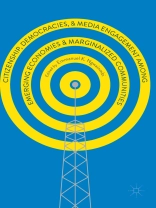This volume analyzes the contexts in which emerging economies in Africa, the Caribbean, Central and South America, the Middle East, and Asia can chart their socioeconomic futures through progressive democratic practices and media engagement. Using political and development communication, along with case studies from selected countries in these regions, the volume addresses human rights policies, diplomatic practices, democratization, good governance, identity politics, terrorism, collective action, gendered crimes, political psychology, and citizen journalism as paradigms for sustainable growth. Through practical experiences and field research in the selected countries, scholars show how personal and national freedoms as well as business deals have been negotiated in a bid to create a new socioeconomic culture within the nations.
Tabla de materias
Chapter 1. An External Examination of Emerging Democratic Institutions and the Problem of Social and Economic Security.- Chapter 2. Navigating the Development Aid Challenge: Towards a More Encompassing Framework.- Chapter 3. The Impact of Regionalism on Democracy Building: An examination of the Southern African Development Community (SADC).- Chapter 4. The Role of Cyberactivism in Disambiguating the Cosmopolis and Discourse of Democratization.- Chapter 5. The Changing Face of Television and Public Policy Implications in India.- Chapter 6. Television, Political Imagery, and Elections in India.- Chapter 7. Media Exposure of Corruption and Re-election Chances of Incumbent Parties in Africa.- Chapter 8. The Impact of Governmental Strategies on Black Political Discourse Groups: Voices Heard from the Black Panther Party to the Black Lives Matter Movement.- Chapter 9. The Mediatization of Violence: A Model for Utilizing Public Discourse and Networking to Counter Global Terrorism.- Chapter 10.The Assassination of Journalists in Mexico: A Product of Criminal and Electoral Competition.- Chapter 11. Land Tenure, Community Space and Media Engagement as Determinants of Good Governance in a Central American State: The Case of Guyana.- Chapter 12. Moving Beyond “Illiberal Democracy” in Sub-Saharan Africa: Recalling the Significance of Local Governance.- Chapter 13. Use and Misuse of Data in Advocacy, Media and Opinion Polls in Africa: Realities, Challenges and Opportunities.- Chapter 14. Media Advocacy and Strategic Networking in Transforming Norms and Policies.
Sobre el autor
Emmanuel K. Ngwainmbi is an independent communication and advocacy expert. He has previously lectured at Elizabeth City State University, George Washington University, and University of North Carolina at Charlotte, among other institutions of higher education in the US, Asia, and Africa. He currently serves as Editor-in-Chief of the Journal of Mass Communication and Journalism and as a senior communication consultant for the United Nations and other intergovernmental agencies.











